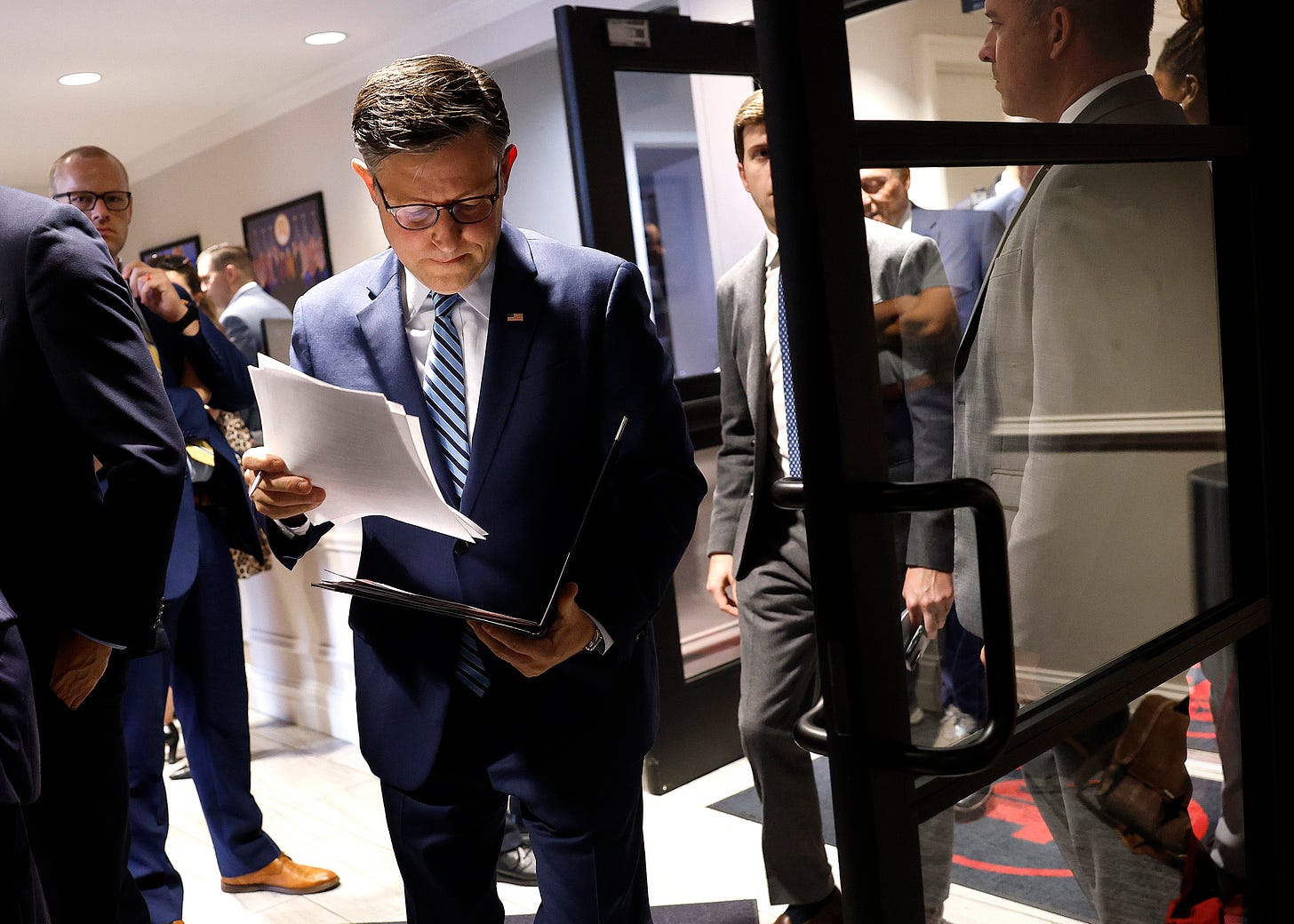House Approves Trump-Backed Spending Cuts Bill, Slashing Foreign Aid and NPR Funding
Trump is slated to sign the legislation ahead of their midnight deadline.

Support independent journalism, $5/month, $50/year. No billionaires, no bribes.
After days of infighting and procedural delays, the House passed a Republican-led rescissions package just after midnight Friday, slashing over $9 billion in federal spending — including major cuts to foreign aid and public broadcasting. The bill now heads to President Trump’s desk ahead of a Friday night deadline.
The legislation codifies President Trump’s proposed cuts, including $7.9 billion from foreign assistance and $1.1 billion from the Corporation for Public Broadcasting, which helps fund NPR and PBS.
To expedite the process, House Republicans used a procedural maneuver to “deem” the bill as passed — a common time-saving tactic for budget-related measures that allowed the legislation to clear the chamber without a standalone final vote. It ultimately passed 216-213.
GOP lawmakers defended the cuts as long overdue, casting the measure as a move to rein in wasteful spending and reduce the influence of left-leaning institutions funded by taxpayers.
“We are cutting waste, fraud, and abuse in government spending,” said House Majority Leader Steve Scalise (R-La.) during debate, “including millions for anti-Israel groups, foreign pride parades, and even Iraqi Sesame Street.”
Rep. Chip Roy (R-Texas) strongly supported defunding public broadcasting, criticizing NPR’s delayed response during recent flooding in Texas.
“It took NPR through Texas Public Radio 19 hours to post anything about the flooding,” Roy said on the floor. “Private stations were breaking in to tell people what to do — because they’re locally owned and actually respond to the people.”
Roy also took aim at U.S. foreign aid spending: “Why should the people of Texas be paying for $32,000 for transgender comic books in Peru, or $6 million to fund tourism in Egypt, or $2 million for sex changes and LGBT activism in Guatemala?” he asked.
Democrats sharply opposed the bill, arguing that it targets vulnerable communities and reflects an ideologically driven agenda.
“Only in Washington, D.C., could politicians come to the floor and brag about cutting $9 billion from rural radio stations while two weeks ago they voted to increase the deficit by $4 trillion,” said Rep. Joe Neguse (D-Colo.). “Spare us these lectures… This bill is a war on rural America.”
House Minority Leader Hakeem Jeffries (D-N.Y.) used his floor time to sharply criticize the bill, reading personal stories of Americans impacted by cuts to Medicaid, SNAP, and other public services.
“Republicans are governing by cruelty,” Jeffries said. “They don’t want the American people to know what’s in this bill — because it’s shameful.”
The bill’s path was also complicated by GOP efforts to tie the vote to calls for transparency around the Epstein files, further exposing divisions within the party. Notably, Republicans on the House Rules Committee voted against advancing a bipartisan Epstein resolution co-sponsored by Reps. Thomas Massie (R-Ky.) and Ro Khanna (D-Calif.), instead backing a GOP-led nonbinding version expected to receive a vote next week.
The Senate passed the measure early Thursday morning after removing a controversial provision that would have cut $400 million from the President’s Emergency Plan for AIDS Relief (PEPFAR).
Help build the 24sight News community. Sign up, follow, subscribe, share, comment. Support the mission of real journalism, accountability, speaking truth to power.
YouTube | Bluesky | TikTok | X (when necessary) | The OG, Substack
News that gets through in DC, VA, PA
Sponsors of 24sight News get in front of our highly engaged audience of decisionmakers, professionals, thought leaders, national media and more. Top readers include heavy engagement in Northern Virginia, the suburbs of Philly and Pittsburgh and Capitol Hill.
Get in touch to discuss sponsorship options: sales@24sight.news.


